|
|
|
Sort Order |
|
|
|
Items / Page
|
|
|
|
|
|
|
| Srl | Item |
| 1 |
ID:
151592
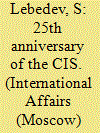

|
|
|
|
|
| Summary/Abstract |
Armen Oganesyan, Editor-in-Chief of International Affairs: This year, the CIS is 25 years old. There is a view that the CIS facilitated a civilized divorce of the Soviet republics. What do you think about it?
|
|
|
|
|
|
|
|
|
|
|
|
|
|
|
|
| 2 |
ID:
134170
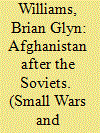

|
|
|
|
|
| Publication |
2014.
|
| Summary/Abstract |
In 1989 the Soviet Union withdrew its forces from Afghanistan leaving the embattled Afghan Communist government of President Mohammad Najibullah to fight against an emboldened mujahideen insurgency. Most experts expected a quick mujahideen victory once the Soviets were no longer directly involved in counterinsurgency operations in support of the Afghan government. But in the spring of 1989 the Afghan Communists beat the odds and defeated a mujahideen rebel offensive designed to capture the eastern city of Jalalabad. This proved to be a turning point, and for the next three years the Najibullah regime held out against the mujahideen 'freedom fighters'. In fact the Afghan Communist regime actually outlasted its sponsor the Soviet Union. The reasons for this remarkable achievement can be traced, in part, to ethnic-tribal divisions among the quarreling mujahideen parties and the Afghan government's ability to exploit them. This largely untold story has obvious implications for understanding the future of post-Karzai Afghanistan, tribalism, ethnicity, and foreign sponsorship in post-US Afghanistan. This article will explore the reasons for the resilience of the Najibullah Communist government and then assess possible implications for a post-2014 Afghan government.
|
|
|
|
|
|
|
|
|
|
|
|
|
|
|
|
| 3 |
ID:
091407
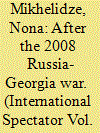

|
|
|
|
|
| Publication |
2009.
|
| Summary/Abstract |
The Georgian-Russian war in August 2008 and Russia's ensuing recognition of South Ossetia's and Abkhazia's independence have generated a new context in relations between the EU, the US and Russia. The crisis created new sources of instability in the entire post-Soviet space, highlighting a new form of Russian revisionism and revealing the limitations of Western policies in what the Kremlin views as its sphere of influence. Caucasian-Central Asian states now wonder whether it is worth complicating their relations with Moscow for the sake of limited or uncertain support from the West. Even if the long-term repercussions of the Russian-Georgian crisis remains unpredictable, one thing is clear: the EU and the US should engage with the region more intensively. In the long run, only economic development in the region, genuine democratisation and real prospects of becoming anchored in Euro-Atlantic structures, alongside effective confidence-building measures between the parties, will be able to induce the secessionist regions to rethink their future.
|
|
|
|
|
|
|
|
|
|
|
|
|
|
|
|
| 4 |
ID:
166025
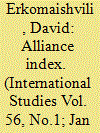

|
|
|
|
|
| Summary/Abstract |
Orthodox approaches developed by Alliance Theory to study alliances are characterized by static and state-centric focus, which exposes theory’s logical limitations. In contrast, modern alignments are marked by continuous oscillations. Alignment stability—according to orthodox Alliance Theory—may be altogether misleading for the explanation of behaviour in alignment. This article theoretically re-conceptualizes the key notion of the orthodox Alliance Theory—the concept of alliance. Building on the basis of isolated but significant fragments of advanced research, the theoretical essence of the Alliance Theory is adjusted to encompass alignment process. Importantly, such a re-calibration bears in on an overlooked element common to all alignments—fluidity. Theoretical modification resulted in two important outcomes. First, the change of the vantage point in explaining alignments theoretically extends the orthodox Alliance Theory’s traditionally limited applicability, which excluded subnational and non-state actors. Second, the change allowed reviewing the essence of alignments focusing on a persistently evolving process, rather than on alignments’ institutional image. Sustained realignment, upgrading or downgrading of cooperative relations between actors and concurrent alignment to rival parties is no more confusing in explaining alignments. The article develops an alignment index and calculates it for the post-Soviet space.
|
|
|
|
|
|
|
|
|
|
|
|
|
|
|
|
| 5 |
ID:
075438
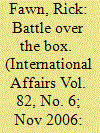

|
|
|
| 6 |
ID:
132706
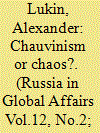

|
|
|
|
|
| Publication |
2014.
|
| Summary/Abstract |
Instead of chauvinism and chaos Russia needs a third alternative. And that is a combination of moderate patriotism and moderate liberalism manifesting itself in the commitment to freer life by law, without corruption, but with mature self-government.
|
|
|
|
|
|
|
|
|
|
|
|
|
|
|
|
| 7 |
ID:
083273
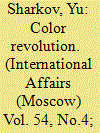

|
|
|
|
|
| Publication |
2008.
|
| Summary/Abstract |
WAVE OF SO-CALLED "COLOR REVOLUTIONS" has swept the world, including the post-Soviet space, over recent decades. They followed the same scenario although they had different names ("the Rose Revolution" in Georgia, "the Orange Revolution" in Ukraine, "the Tulip Revolution" in Kyrgyzstan or "the Potato Revolution" in Belarus). ... The first phase of such revolutions - the preparatory phase - takes a fairly long period of time when every effort is made to mobilize the forces to be involved in planned actions. ...
|
|
|
|
|
|
|
|
|
|
|
|
|
|
|
|
| 8 |
ID:
132887
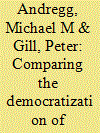

|
|
|
|
|
| Publication |
2014.
|
| Summary/Abstract |
This introductory article discusses some of the main themes that are contained within this collection originally delivered as papers to two conferences. There is brief consideration of some issues of method and major themes relating to the legacy of authoritarian regimes, the process of change and the current state of 'democracy' are identified. Continuing controversies and uncertainties around intelligence have important implications for democratic governance in many countries which must encourage more comparative work in this key area of intelligence studies.
|
|
|
|
|
|
|
|
|
|
|
|
|
|
|
|
| 9 |
ID:
152690
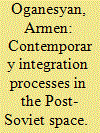

|
|
|
|
|
| Summary/Abstract |
THIS IS THE SEVENTH TIME we are meeting in Yalta for what has already become a traditional international conference organized by the journal International Affairs with support from the Ministry of Foreign Affairs. This time, our discussion is focused on the specifics of contemporary integration processes in the post-Soviet space. A quarter of a century has passed since the disintegration of the USSR and the formation of the CIS. This is a considerable historical period that gives us food for thought and discussion, as a result of which we could not only draw conclusions regarding the status quo of the Commonwealth but also outline its development paths for the future. At the same time, it is obvious that we are going through a very complex and dynamic stage that is leading to deeper integration.
|
|
|
|
|
|
|
|
|
|
|
|
|
|
|
|
| 10 |
ID:
132702
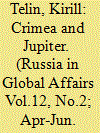

|
|
|
|
|
| Publication |
2014.
|
| Summary/Abstract |
The use of force is no longer legitimate like it was in the 19th and 20th centuries. Conservative-style action from the position of force cannot achieve anything in terms of boosting a country's position even within the traditional zone of influence.
|
|
|
|
|
|
|
|
|
|
|
|
|
|
|
|
| 11 |
ID:
132711
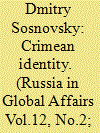

|
|
|
|
|
| Publication |
2014.
|
| Summary/Abstract |
Kiev's attempt to build an all-Ukrainian identity solely on the basis of the Ukrainian ethnos through political centralization, cultural unification, and forceful assimilation was a complete failure. Now, as part of the Russian Federation, which pursues an entirely different regional policy, Crimea has an opportunity to form its own regional identity.
|
|
|
|
|
|
|
|
|
|
|
|
|
|
|
|
| 12 |
ID:
180488
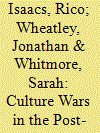

|
|
|
|
|
| Summary/Abstract |
In the last decade the term culture war has become hard to avoid. If it is not yet the buzzword of the first part of the twenty-first century, it soon will be. Culture wars seem to be around us everywhere. Each passing week brings some new mention of an outbreak in a public institution, civic space or political arena in some part of the globe. Culture wars are the phenomenon we cannot seem to shake. Battle lines are drawn, rhetorical tools are sharpened and social media awash with vitriol and moralising, and seemingly unbridgeable social gaps. If the immediate post-Cold War period did usher in an era of universal global liberalism, decades on it is now far in the distance, only visible in the rear-view mirror. Instead, around us lie social and political fault lines featuring competing visions of what should be the appropriate normative basis upon which societies should be constituted. They are debates that focus on belonging, on citizenship, on rights and identities.
|
|
|
|
|
|
|
|
|
|
|
|
|
|
|
|
| 13 |
ID:
134123
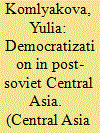

|
|
|
|
|
| Publication |
2014.
|
| Summary/Abstract |
The author analyzes how the Central Asian countries (Kazakhstan, Uzbekistan, and Kyrgyzstan) are moving toward democracy, as well as the political and geopolitical reasons behind the United States' interest in the region triggered by the Soviet Union's disintegration and Washington's desire to consolidate its position in the post-Soviet space. It was determined to realize its interests by planting democratic values in the newly independent states and urging them to orientate themselves toward democratic principles when shaping their policies. In this way, the Central Asian countries could count on Washington's political support and economic aid.
In an effort to enter the world scene as democratic states, the Central Asian countries built state structures that relied on constitutions describing them as democratic states; they created a party and election system and passed laws on the freedom of speech, glasnost, etc. This, however, has not transformed the post-Soviet Central Asian republics into paragons of democracy: the clan system is very much alive in the corridors of power; Soviet mentality remains predominant among state officials (practically all the top figures preserved their posts in the newly independent states); and the influence of Russia and the authoritarian traditions inherited from the past is still very obvious.
|
|
|
|
|
|
|
|
|
|
|
|
|
|
|
|
| 14 |
ID:
132705
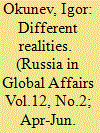

|
|
|
|
|
| Publication |
2014.
|
| Summary/Abstract |
The new post-Crimean risk for Russia's political system is not so much in putting political participation on freeze as in forcing this participation, which might push the country onto the road to ideology-driven authoritarianism.
|
|
|
|
|
|
|
|
|
|
|
|
|
|
|
|
| 15 |
ID:
188472
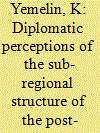

|
|
|
|
|
| Summary/Abstract |
IN CONTRAST to the rather clearly defined state borders, the division of the ecumene into regions and subregions is relative and highly speculative. It is implemented at the level of individuals and social groups, as well as states and political blocs. The classics of critical geopolitics, who insist on the socially conditioned basis of the perception of political and geographical space, argue that the drawing of boundaries may be both "conceptual and cartographic, imaginary and actual, social and aesthetic."
|
|
|
|
|
|
|
|
|
|
|
|
|
|
|
|
| 16 |
ID:
160952
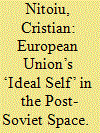

|
|
|
|
|
| Summary/Abstract |
During the last two decades, one of the cornerstones of the foreign policy of the European Union (EU) has been the development of a strong presence in its neighbourhood. The 2003 Security Strategy and the recent 2016 Global Strategy highlighted the need to show that the EU can play a major role in the international arena by first establishing a strong presence in the neighbourhood and proving the union’s effectiveness in the region. In this context, the aim of the essay is to explore the way the EU’s ‘ideal self’ is constructed and perceived in the post-Soviet space.
|
|
|
|
|
|
|
|
|
|
|
|
|
|
|
|
| 17 |
ID:
132709
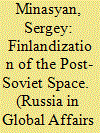

|
|
|
|
|
| Publication |
2014.
|
| Summary/Abstract |
Armenia, opting for self-restraint of its own accord, minimized its risks and losses. As to whether the Armenian-style Finlandization can be an example for other former Soviet republics would depend not only on their own choice.
|
|
|
|
|
|
|
|
|
|
|
|
|
|
|
|
| 18 |
ID:
179548
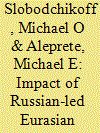

|
|
|
|
|
| Summary/Abstract |
This article examines how variations in the degree of integration with the Russian Federation influence relations among post-Soviet states. Eurasian integration has been a significant priority of Russian foreign policy in the Putin era; the Russian Federation serves as the regional hegemon for Eurasian integration. Hegemonic stability theory suggests that hegemonic states reduce uncertainty and provide increased opportunities for cooperation among those states operating within the international systems they manage. To what extent is this true for the states involved in Russian-led Eurasian integration? Using treaty data between 1992 and 2005 to capture the extent of integrative ties with Russia, this article examines the impact of Russian-led integration on the level of cooperation among post-Soviet states. The results of this analysis indicate that Russian hegemony influences regional political alignment, expressed in roll-call voting within the UN framework.
|
|
|
|
|
|
|
|
|
|
|
|
|
|
|
|
| 19 |
ID:
160951
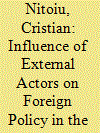

|
|
|
| 20 |
ID:
174519
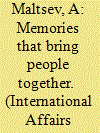

|
|
|
|
|
| Summary/Abstract |
In memory of my grandfather, Alexey Ruchnov, a veteran of the Great Patriotic War, and of the millions of Soviet people who gave their lives for the peace of future generations.
|
|
|
|
|
|
|
|
|
|
|
|
|
|
|
|
|
|
|
|
|